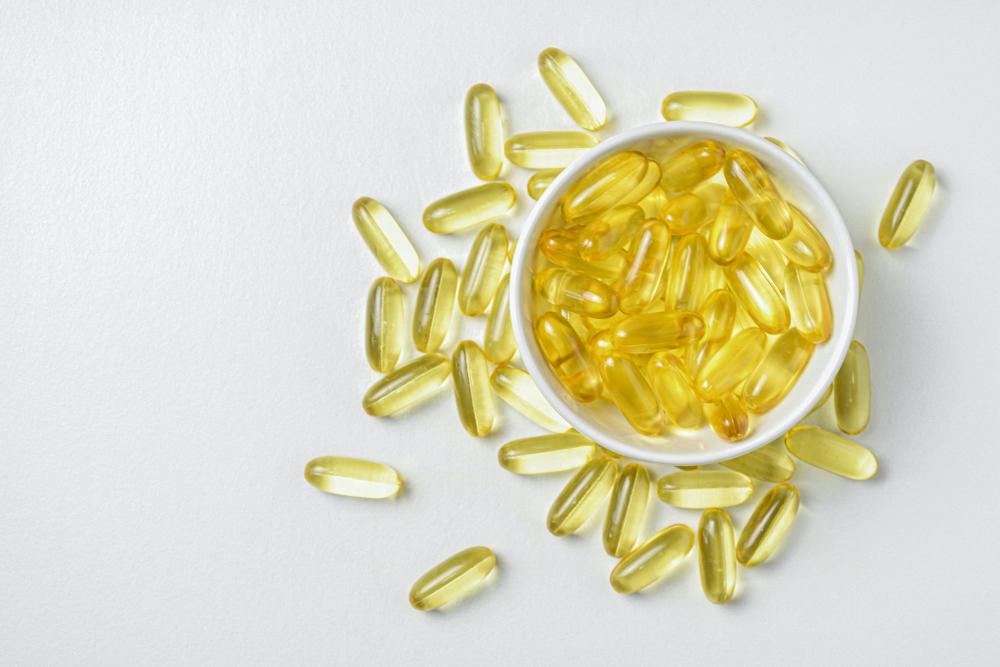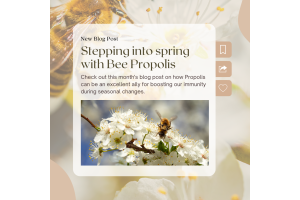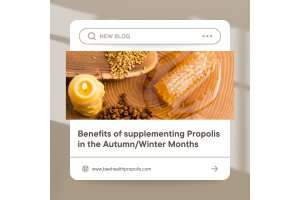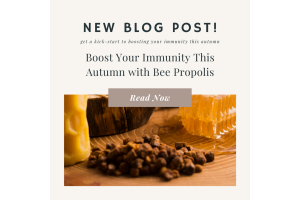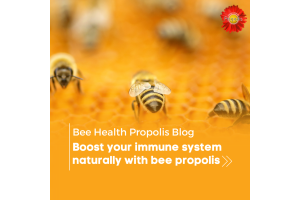The Health-Guarding Powers of Bee Propolis
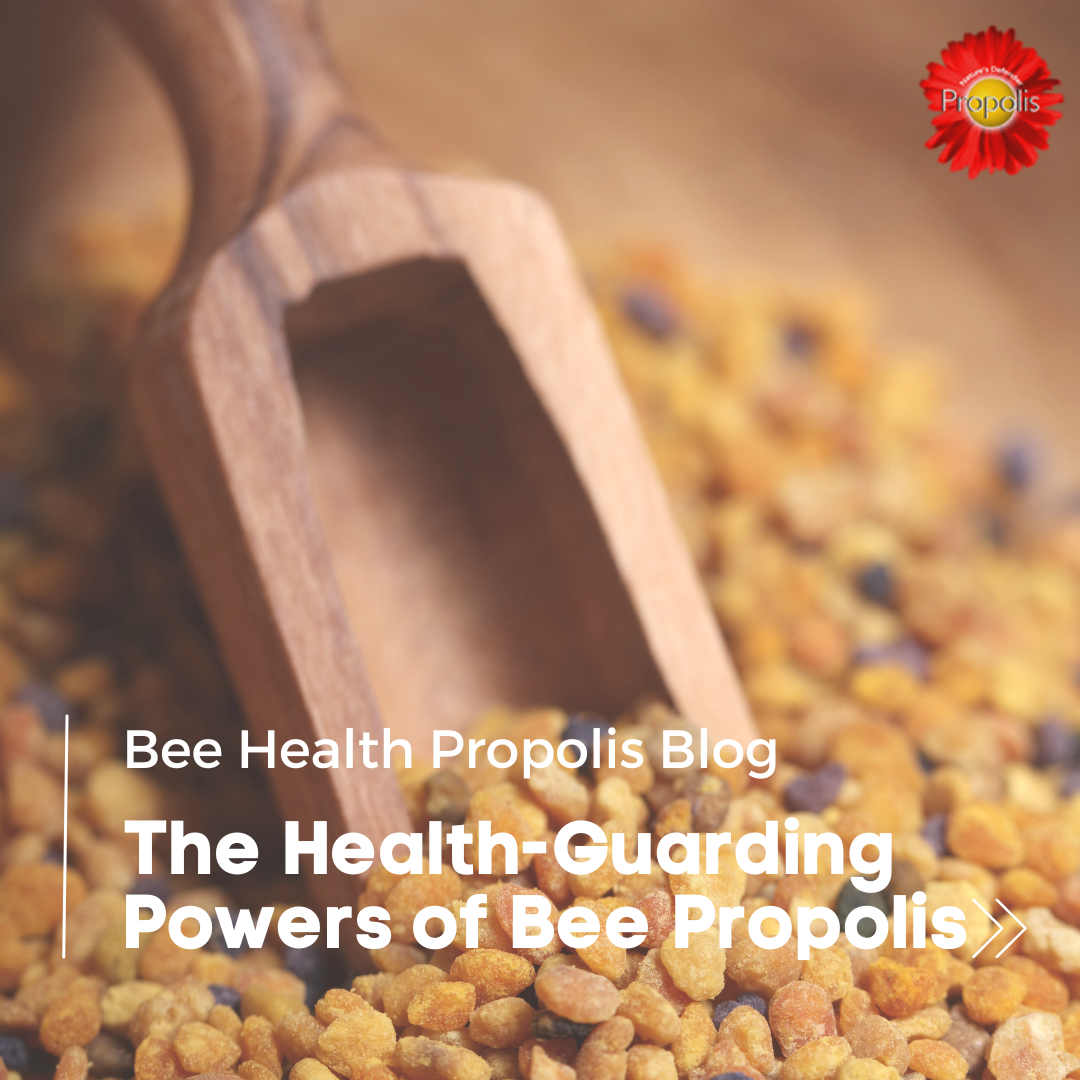
Honeybees collect resins and buds from trees and plants to produce the sticky substance propolis. They use this material throughout the hive as a protective sealant and disinfecting agent. The propolis acts as a medicinal defence system for the bee colony, guarding against harmful bacteria and fungi that might otherwise threaten the health of the hive community.
In other words, bees make building blocks and medicine - not just honey.
But where there's sugar, there's humans, who have harvested bee propolis for centuries to treat wounds and fend off infections.
But is there any science behind it? It turns out there is. Studies indicate propolis packs serious germ-fighting power – it can stop the spread of bacteria, fungi, and treat cold sores, genital herpes, neurodermatitis, gum disease, and other oral infections.
Critical compounds in propolis, like caffeic acid, also appear to ease symptoms linked to minor burns, acne flare-ups, asthma, and runny noses.
Additional research shows that Indian propolis wields antioxidant clout with polyphenols that protect cells from damage by neutralising free radicals.
Healthcare experts have noticed those effects, and they use extracts, capsules, and creams to let people enjoy their numerous health benefits.
We provide more colour on these below.
Antimicrobial Properties
For centuries, we've known that propolis delivers sweet antimicrobial relief. The gooey, waxy tree sap honeybees used as a sealant and fortress can also impressively beat back bacteria and fungi. Bugs don't stand a chance against this stuff.
Multiple studies now reveal that propolis packs notable antibacterial effects. Some of our peskiest pathogens – Staphylococcus, Streptococcus, and Enterococcus bacteria – shrivel in propolis.
The key is likely a trio of antibacterial flavonoids in propolis: pinocembrin, galangin, and pinobanksin. These compounds bust through microbial cell walls, shutting down vital bacterial enzymes and signalling pathways in their tracks.
And it's not limited to bacteria alone. Researchers also note antifungal success when propolis meets notorious yeasts like Candida albicans or C. glabrata head-on, trouncing the fungi responsible for a maddening array of mouth, throat, gut, and genital infections. The antifungal angle derives from other natural phenolic acids within propolis.
Antifungal Properties
When tested against yeast species like Candida albicans or the infectious mould Aspergillus, propolis extracts reliably inhibit the proliferation and spread of these fungi.
The compounds in propolis prove remarkably effective at hampering Candida yeasts - significantly blocking the growth and viability of notoriously drug-resistant species like C. glabrata and C. krusei. The antifungal activity derives from a medley of phenolic acids and flavonoids within the resin.
Ingredients like the acids caffeic, ferulic, p-coumaric, and benzoic likely mingle forces with flavonoids such as pinocembrin, chrysin, galangin, quercetin, and apigenin to overwhelm invasive fungus through a flexible multi-pronged attack strategy.
Anti-Inflammatory Properties
Long before modern NSAIDs emerged, traditional healers and beekeepers harnessed propolis to tame inflammation. We now realise why - this sticky bee glue brims with dozens of powerful anti-inflammatory agents.
Animal studies reveal that propolis applied topically significantly reduces swelling and joint stiffness in inflamed arthritic joints.
Propolis can short-circuit the usual inflammation sequence and prevent the flood of inflammatory prostaglandins, leukotrienes and cytokines that otherwise follow.
Propolis is helpful for soothing wounds, burns, acne flare-ups, and skin conditions. Galanin and other supportive anti-inflammatory flavonoids within propolis bolster their ability to calm inflamed tissues.
Centuries of traditional use again find modern confirmation here. Propolis can offer an all-natural alternative for quelling multiple pathways of inflammation simultaneously. Our ancient friends saw the dramatic results of propolis for conditions involving inflammation long before we unravelled the molecular mechanisms.
Dental Health Properties
Propolis contains antibacterial flavonoids and phenols restricting plaque-causing bacteria, including the gum disease villain Porphyromonas gingivalis.
With routine use as a mouth rinse or toothpaste, propolis can significantly slow dental plaque accumulation while improving gum health.
Beyond fighting germs, propolis also tames inflammation with its gentle anti-inflammatory properties. Unlike harsh ingredients like chlorhexidine, propolis calms oral tissues without excessive irritation. This makes it ideal for soothing the red, swollen gums of gingivitis or oral wounds following invasive dental work.
Antioxidant Properties
It turns out honeybees produce a dynamite antioxidant in propolis. This resin's broad spectrum of polyphenols, flavonoids, and aromatic compounds offers some serious free radical scavenging activity.
Studies confirm that propolis extracts can effectively neutralise unstable cell-injuring molecules, such as the reactive oxygen species that run riot in infection, ageing, and disease initiation.
Specific compounds isolated in propolis, including quercetin, kaempferol, and apigenin, appear especially adept as antioxidants. But propolis also indirectly bolsters our native antioxidant defences - preserving protective superoxide dismutase, glutathione, catalase, and other enzymes our bodies manufacture to tame oxidative stress.
Evidence indicates that propolis extracts can safeguard against drug- or pollution-induced damage to the liver and kidneys, heart, and blood vessels by absorbing free radicals and maximising endogenous antioxidants.
Once more, the bees seem ahead of medical science - deftly crafting in propolis a potent antioxidant ally we're now proving can serve as a formidable cellular protectant against the ravages of oxidative damage related to disease progression and ageing. Our buzzing little collaborators continue schooling us in natural preventative health.

